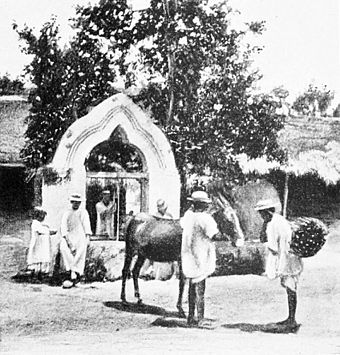An instrument that they use in their religious practices is the tunkul. The literal meaning of this word is "to be worshiping." The tunkul is a piece of wood three feet long and one in diameter, hollowed out. On one side it has a mouth extending nearly from end to end; on the other are two oblong tongues starting from the extremities and separated in the middle only by the thickness of a carpenter's saw. Its mouth is placed in contact with the ground, and the tongues, serving as two keys, are struck with sticks whose ends are covered with India rubber, which makes them rebound. The tones thus produced can be heard five or six miles off, when the wind is favorable, and sound like a great rumbling in the earth. The same instrument was used in Mexico.

A Well by the Wayside.
In the museum of the capital of that republic some finely sculptured tunkuls are preserved.
The Maya Indians take a great deal of pleasure in ceremonies and religious observances; religion is a very important matter with them, though it is doubtful if they could tell exactly what they believe. They punctually attend church, but their worship is in reality an odd mixture of paganism and Christianity. Being fond of sweet things, and by nature indolent, their idea of heaven is a place where they will rest beneath the spreading branches of an evergreen tree and enjoy an inexhaustible supply of sweet things; while hell is a region where they will suffer intensely from cold, fatigue, and hunger. Nor do they hope to escape that

